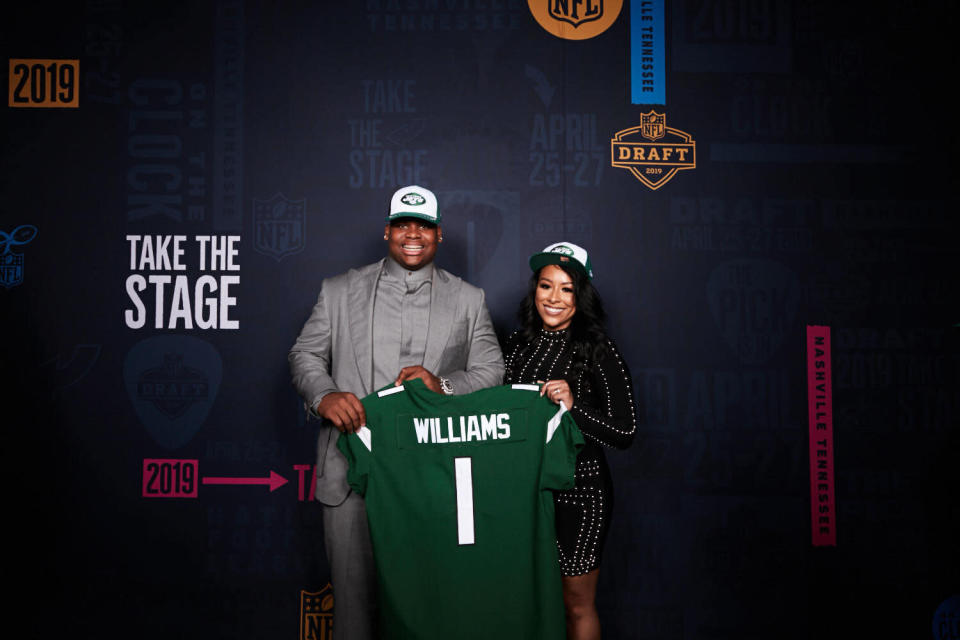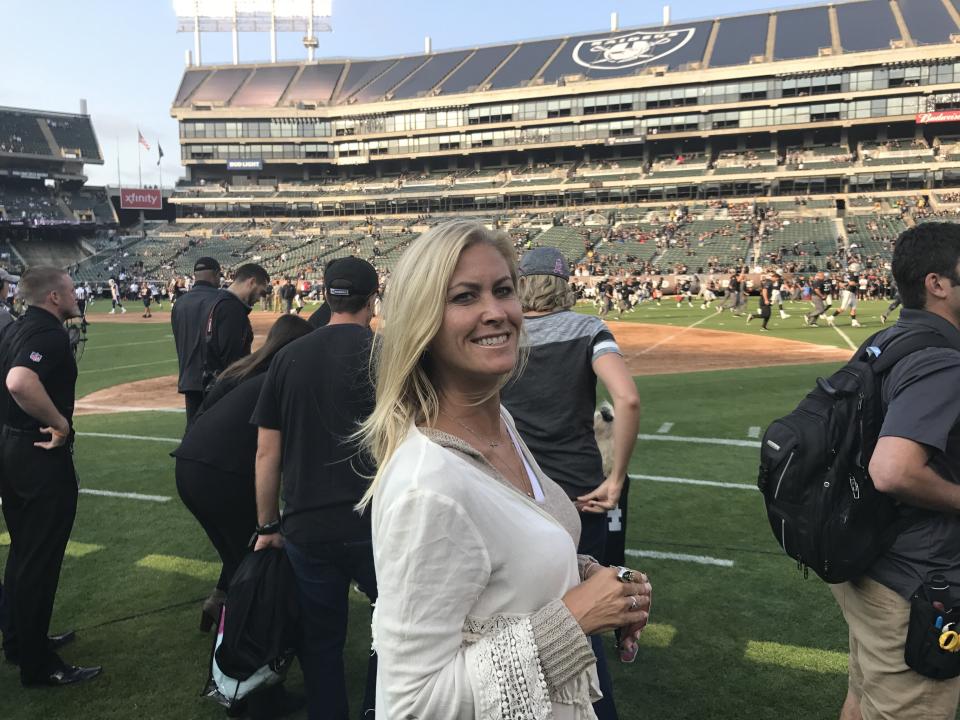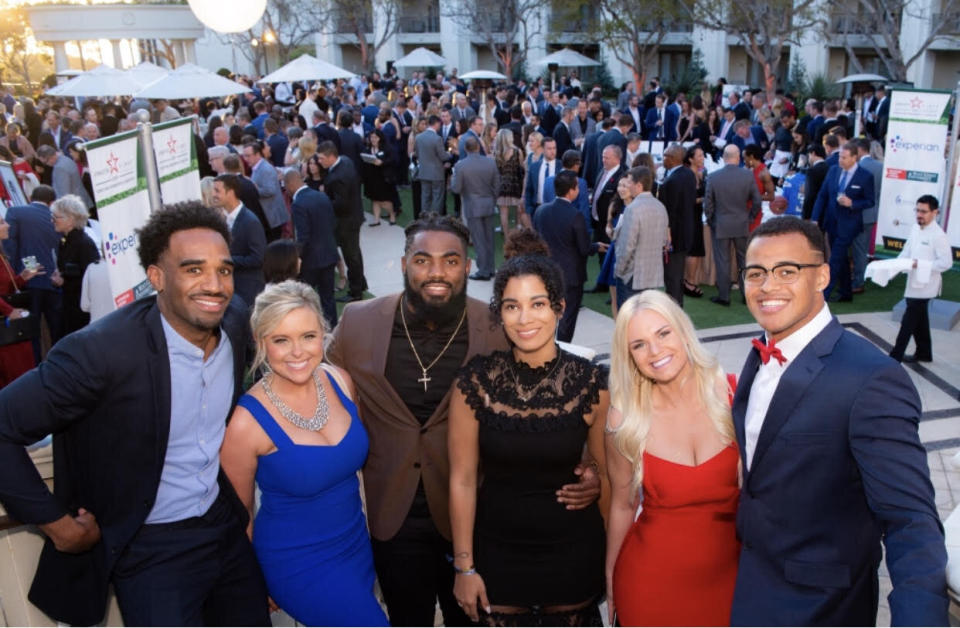NFL agency is changing, and it's because of women
When NFL commissioner Roger Goodell called Quinnen Williams’ name as the third overall pick in the 2019 draft, Williams first gave his grandmother a hug. Then he turned to the other woman sitting next to him for a handshake he made up for her.
She was his agent, Nicole Lynn, who had just become the first black woman to represent a top-five draft pick.
Lynn is the latest crusader in an industry where women make up a small percentage of the field. There are 795 total NFL agents, according to the NFLPA. Forty one of them are women, and of those 41, only 21 have a client on a current NFL roster. That’s less than 3 percent.
Those women don’t exist in a vacuum. They collaborate with male agents, players, team executives, scouts and coaches every day. Through these interactions, they’re not only excelling in NFL player representation, but changing the traditional agent-client relationship.
Lynn grew up in an impoverished neighborhood stricken by gun violence in Tulsa, Oklahoma. She says she watched as boys made it out of poverty through football only to lose their wealth because of poor money management. Lynn was never, and still isn’t, a football fan, but she wanted to put an end to this cycle.
She became a financial analyst on Wall Street in hopes of becoming an adviser to athletes. She soon realized it was the agents who managed players’ money, so she quit her job and went to law school.
None of her classmates in law school wanted to be agents, and anytime she spoke of her aspiration, people took it as a joke. Lynn said it was “like telling people you wanted to be a rapper.”

She eventually stopped telling people because she was embarrassed, a feeling that followed her throughout player recruitment.
“I have been in some horrific situations,” Lynn said. “You’re chasing men every day. Some are ghosting you, messing with your mind. In the real world it’s men chasing women. In my world it’s a 21-year-old kid cutting my check. It messes with your self-confidence and brings up your insecurities.”
Lynn, 30, started representing players at 26. Her gender and race were already hurdles, but her age became the biggest challenge. Most of the athletes were the same age as her, so older agents discredited her talent.
She found an advantage to her youth on social media. Other agents initially sneered at her posts, but now she sees their accounts becoming more active. She can also relate to players as a fellow millennial.
“They are like little brothers,” Lynn said. “They open up to me and talk to me about things they might not open up to others about. I can relate to them. We have these intimate conversations about their goals and dreams. I know all their deep, dark secrets.”
***
Kelli Masters became the first woman to represent a first-round pick in 2010 when she co-represented the No. 3 overall pick Gerald McCoy.
Masters also grew up in Oklahoma. She loved football, but never anticipated a career in the industry.
She spent her whole life achieving: She got into law school, won Miss Oklahoma in 1997 and competed internationally for baton twirling. But none of these accomplishments served a deeper purpose, so she used her law degree to become a nonprofit lawyer and establish charities.
As she practiced, athletes started seeking her help to set up foundations and manage endorsements. That’s when she discovered there was a career in football meant for her: player representation.
Her coworkers thought she was crazy. Men had previously tried to start firms in Oklahoma City, which had no professional sports teams at the time, and failed.
The outside world was even less receptive. She was told women weren’t meant to be NFL agents; they’re too emotional; they can’t understand the industry because they’ve never played football; they aren’t tough negotiators.
Male agents ignored her when she reached out for advice, and a potential client’s mother told her they wouldn’t sign with a woman.
“I felt like David facing Goliath,” she said. “It reminds me fight in my own armor every day. That what I have is enough. If you truly believe it's where you belong, you have the strength within you to do this.”
Without quitting her job as a nonprofit lawyer, she founded KMM Sports in 2005. A year after Masters opened her agency, she signed former Tennessee Titans quarterback Cody Hodges.
He would be the first of many clients who validated her belief that she belonged.
“People told me I was never going to make it,” Masters said. “I proved them wrong.”
***
Phyllis Freed, who died in 2004, is thought to have been the first female NFL agent when she opened an agency in the 1980s. Jill McBride Baxter followed close on her heels and began representing kickers and punters in the 1990s.
But by the turn of the century, the idea of female agents was still rare.
Kristen Kuliga began working in-house counsel in 1994 at Woolf Associates in Boston. In one of her first years at the agency, she says her coworkers were looking to hire a new agent. As her colleagues described the potential candidates, they exclusively used male pronouns. Kuliga, the only female employee in a non-administrative role, chimed in: “It could be a her.”
“We would never f------ hire a woman,” she says one of the men told her. “A woman can’t be an agent.”

His words sparked a fire under Kuliga, who passed the certification exam and became the first woman to negotiate an NFL quarterback’s contract in 2001. It was Doug Flutie’s $33 million, six-year deal with the San Diego Chargers, a contract that stamped credibility for Kuliga, who didn’t know at the time that she made history.
Kuliga merged her agency into veteran agent Joby Branion’s Vanguard Sports Group two years ago. Vanguard provides services that other agencies haven’t before, including money management, psychological advising and free training. Branion has known Kuliga for years and asked her to join his agency because of her established contacts and relationships. She also excels in consulting services.
Kuliga opened the door to NFL agencies for other women. Her former intern Kim Miale went on to a successful career at Roc Nation Sports, an agency founded by Jay-Z.
Miale represented Saquon Barkley, the No. 2 overall pick in last year’s draft, which is the highest a player represented by a woman has ever been selected.
“We all try to help each other,” Kuliga said. “We want to see more women succeed in the industry.”
Kuliga still represents Flutie, who has been out of the NFL for 13 years.
“We become sort of family,” she said. “But it is about business.”
While some players prefer the traditional route of speaking to their agent only at contract time, Kuliga and the women who came after her consider it a lifetime commitment where the agent becomes an extension of the player and protects their best interests.
Two hundred and fifty-four players were drafted two weeks ago and even more signed contracts as undrafted free agents. Many of them have DMs full of branding opportunities and sponsors coming at them from all directions. Some will be scams or ripoffs.
Young, inexperienced and many without college degrees, the athletes could be tempted to agree to a sponsorship that’s wrong for their brand or will make them significantly less money than they’re worth.
As Masters explains: “A woman’s approach to representing is different. We’re more caring, comprehensive. We can juggle a lot of issues at once. A lot of young men in the NFL were raised by a single mom. Nothing against men, they’ve done a great job. Women are really well equipped and fierce advocates, protectors.”
Some of Masters’ clients have even told her they can’t imagine signing with a male agent after working with her.
Savannah Foster, an agent at Athletes First, sees the same advantage: “there's certain things we can tune into as females that maybe the men sometimes don't see. I really try to protect the players. I do know what they encounter out there and it’s horrible.”
***
When Foster sat through last year’s recruiting meetings with a swollen belly, it caught people’s attention.
“It was such an interesting dynamic because, again, I don't think anybody’s expecting to see a female agent, typically, and then when you do, a pregnant one at that,” she said. “It’s living what I speak, so family is most important to me.
“I'm so committed to making this work that I'm gonna come here in this meeting while I’m pregnant and try to make a good impression on your family and try to be a part of your family because, again, these relationships transcend more than just an agent-client relationship.”
Foster joined Athlete’s First as an intern in 2008. In college at the University of Louisville, she had a small role managing players at the Orange Bowl and knew that’s what she wanted to do with her life.

Her adviser told her to be an agent, she had to move to New York or California. Growing up in a small town in Kentucky, she thought California was the mecca of sports. She packed her bags and moved to San Diego where she had a brief position with the San Diego Padres then began law school.
She hated the first semester at California Western School of Law so much that she was ready to return to the South, but her mom told her to stick out the first year. She did and found Athletes First at a career fair. That’s when she learned you don’t need a law degree to become an agent.
Foster quit law school to work as a receptionist at Athletes First and as an assistant for its president Brian Murphy. He recognized her talent in client relations and she created a department where she could provide anything players need from flights and rental cars to concert tickets.
Her constant communication with the athletes creates an unexpected relationship: one where they call each other family.
“I talk to Sav every day; she’s like fam to me now,” Jacksonville Jaguars cornerback Jalen Ramsey said. “I never thought it would be like this. It’s not common. I sit in the locker room and I hear too often how players don’t talk to their agents for months.”
Ramsey is represented by Athletes First’s David Mulugheta but works closely with Foster.
Even as support grows for these women from top players like Ramsey and Williams, the validation is not without pushback.
Branion, who considers himself a staunch feminist and wrote for the UCLA women’s law journal when he was in law school, has seen and heard just about everything women faced in his 24 years in the industry.
“When women show up at the [NFL scouting] combine, you’re like, ‘What are they doing? What do they look like? How are they dressing?’” Branion said. “Ironically, the more attracted the men are, the more demeaning they are toward you. If you’re less attractive, if you intentionally play down your attractiveness, they're likely to take you more seriously. The minute you start wearing tight clothes, higher heels, the more revealing or the more attention you draw to yourself, the more likely they are to demean you.”
Appearance has been one of Lynn’s greatest challenges. Prior to the draft, she googled “NFL draft outfits” for women. No results came up. There were no pictures of women on the red carpet or in the draft room. Lynn would set the tone with whatever she wore and she felt the weight of the decision.
“As one of the pioneers in this industry, people are going to look to me,” she said. “Do I want to be one of the guys and wear Nikes and a ballcap? No, I want to be feminine. I want to feel like a woman. Was it easy? No way.”
She sported a black studded long-sleeve dress with neutral makeup and ankle-strap heels on draft night.
Lynn thinks about her appearance everyday, especially on social media. She asks herself before every post: Is this picture too pretty? If it is, she knows she won’t be taken seriously.
There’s not a lot of optimism things will change — even with 33 women taking the agent certification exam last year, a record high since the exam began in 2001.
“The outside world doesn’t get it yet, and I don’t think they will anytime soon,” Foster said. “Anything good takes time.”
But as more women defeat their Goliaths, more young girls see they can do it too. If they want to be in football, they don’t have to be scantily dressed cheerleaders on the sideline. Women can be agents, managers, referees, coaches.
“When it’s not a news story, we will have arrived,” Masters said.
Looking at the headlines following Williams’ selection in the draft, we haven’t arrived yet.
More from Yahoo Sports:

